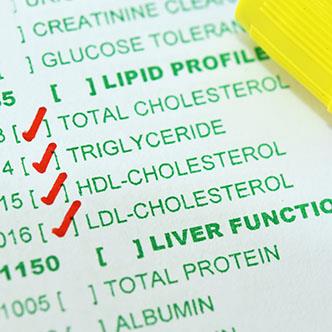
Healthy habits throughout life are at the core of lowering your chance of having a heart attack or stroke. Eating better, moving more, maintaining a healthy weight and not smoking are key to preventing heart disease.
Lifestyle changes – especially heart-healthy eating and regular physical activity – are also at the heart of managing triglycerides, a type of fat in the blood. Along with “good” (HDL) and “bad” (LDL) cholesterol, triglycerides
are included on a standard cholesterol blood test report. High triglycerides are linked to a greater chance of developing heart disease.
To help clinicians and their patients manage hypertriglyceridemia, or very high triglycerides, the American College of Cardiology has released new clinical guidance with practical advice about what healthy habits to adopt and, if needed, medications to
help lower heart risk (“2021 ACC Expert Consensus Decision Pathway on the Management of ASCVD Risk Reduction in Patients With Persistent Hypertriglyceridemia,”
Journal of the American College of Cardiology, July 28).
Here’s what patients should know about the new guidance.
Patients at High Risk
This guidance addresses gaps in care for people at high risk for atherosclerotic cardiovascular disease (ASCVD) with fasting triglyceride levels that are:
- Mild to moderate: ≥150 mg/dL and <500 mg/dL
- Very high: ≥500 mg/dL and especially triglycerides ≥1,000 mg/dL
It also focuses on “persistent hypertriglyceridemia.” A patient has persistent hypertriglyceridemia if they have a fasting triglyceride level of ≥150 mg/dL after 4 to 12 weeks of lifestyle intervention, the highest dose of tolerated statin
(LDL-lowering medication) if indicated and have been evaluated for secondary causes of high triglycerides.
Healthy Habits
Adopting healthy habits is the best way to lower triglycerides. “Lifestyle intervention remains the foundation of management of patients with hypertriglyceridemia,” the guidance states.
Weight Loss
For people with high triglycerides, weight loss is an effective way to lower those levels. In fact, losing just 5% to 10% of body weight is associated with 20% lower triglycerides.
Dietary Changes
Dietary changes in some cases can help cut triglycerides more than 70%. The 2019 ACC/AHA Primary Prevention Guideline recommends following a diet rich in fruits, vegetables, nuts, whole grains, fish or lean meats.
Patients with very high triglycerides also should limit intake of added sugars, sugar sweetened beverages, alcohol, and desserts. Eating whole, fresh fruits and avoiding fruit juices are also beneficial.
The experts recommend eating two or more servings of fish a week (about 8 ounces total), such as salmon, trout, or tuna. But if you have triglycerides above 500 mg/dL, then you might need to lower the amount of fat in your diet. In that case, pick lean
seafood, for example cod, flounder, or shrimp.
Alcohol is associated with higher triglycerides. People at high risk should limit alcohol intake to one drink per day for women and two drinks for men. People with very high triglycerides of 500 mg/dL or more should abstain from alcohol to lower their
chance of developing pancreatitis, a serious condition in which the pancreas becomes inflamed. Pancreatitis can cause significant pain and usually results in hospitalization.
Being Active
Physical activity and exercise can reduce triglycerides up to 30%. But the effectiveness of this behavior depends on what type, how long, and how intense the activity is.
In general, adults should get at least 150 minutes of moderate-intensity exercise or 75 minutes of vigorous physical activity each week to promote good health. To reach that goal, you could try walking briskly for 30 minutes five times in one week.
But experts say that some activity is better than none. So do what you can and try to work up to the recommended amount of activity.
Medications to Lower Triglycerides
In some cases, medications – in addition to healthy habits – might be recommended to lower your triglycerides. People being treated for persistent hypertriglyceridemia might consider non-statin therapies in addition to statins. It is important
to note that statins also lower triglycerides and the risk of heart attack or stroke associated with triglycerides. Therefore, in some cases, your clinician may prescribe you statin therapy if indicated to lower your risk of heart attack or stroke
associated with elevated triglycerides.
High-dose omega-3 fatty acids lower triglyceride levels. Icosapent ethyl, a form of omega-3 fatty acids, has been approved by the Food and Drug Administration to lower cardiac events in patients with or at high risk of heart disease in addition to lowering
triglycerides. Non-prescription fish oil products are classified as dietary supplements and are different from prescription medication.
Secondary Causes
Experts also stress the importance of ruling out and managing other causes of high triglycerides before starting medication. In addition to a sedentary lifestyle and a diet high in carbs and processed foods, causes of high triglycerides include:
- Poorly controlled diabetes, kidney disease, low thyroid levels
- Certain medications, for example beta blockers, antipsychotics and corticosteroids
- Genetic predisposition in which the body produces an excess amount of triglycerides
Team Approach
The experts recommend patients talk to a registered dietitian to better understand the principles of heart-healthy eating and to receive personalized nutritional recommendations.
Keep in mind that there is no one-size-fits-all approach to managing risk. High triglyceride levels, like high LDL cholesterol levels, should trigger a conversation with patients and their care team about the factors that increase their personal risk.
Clinical guidance is based on the best evidence available. As research continues, these recommendations will be updated.
To learn more about very high triglycerides, visit CardioSmart.org/VHTG.